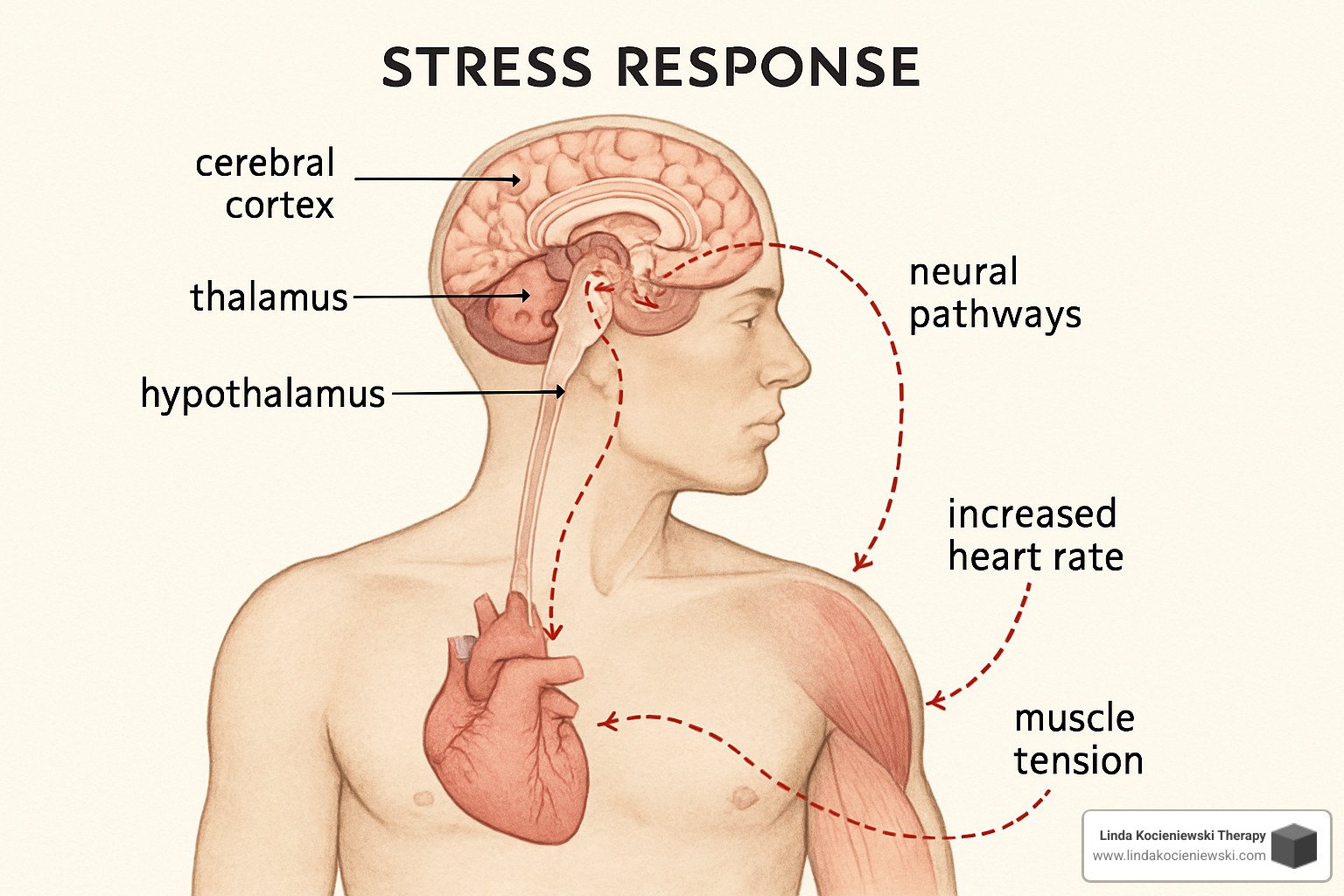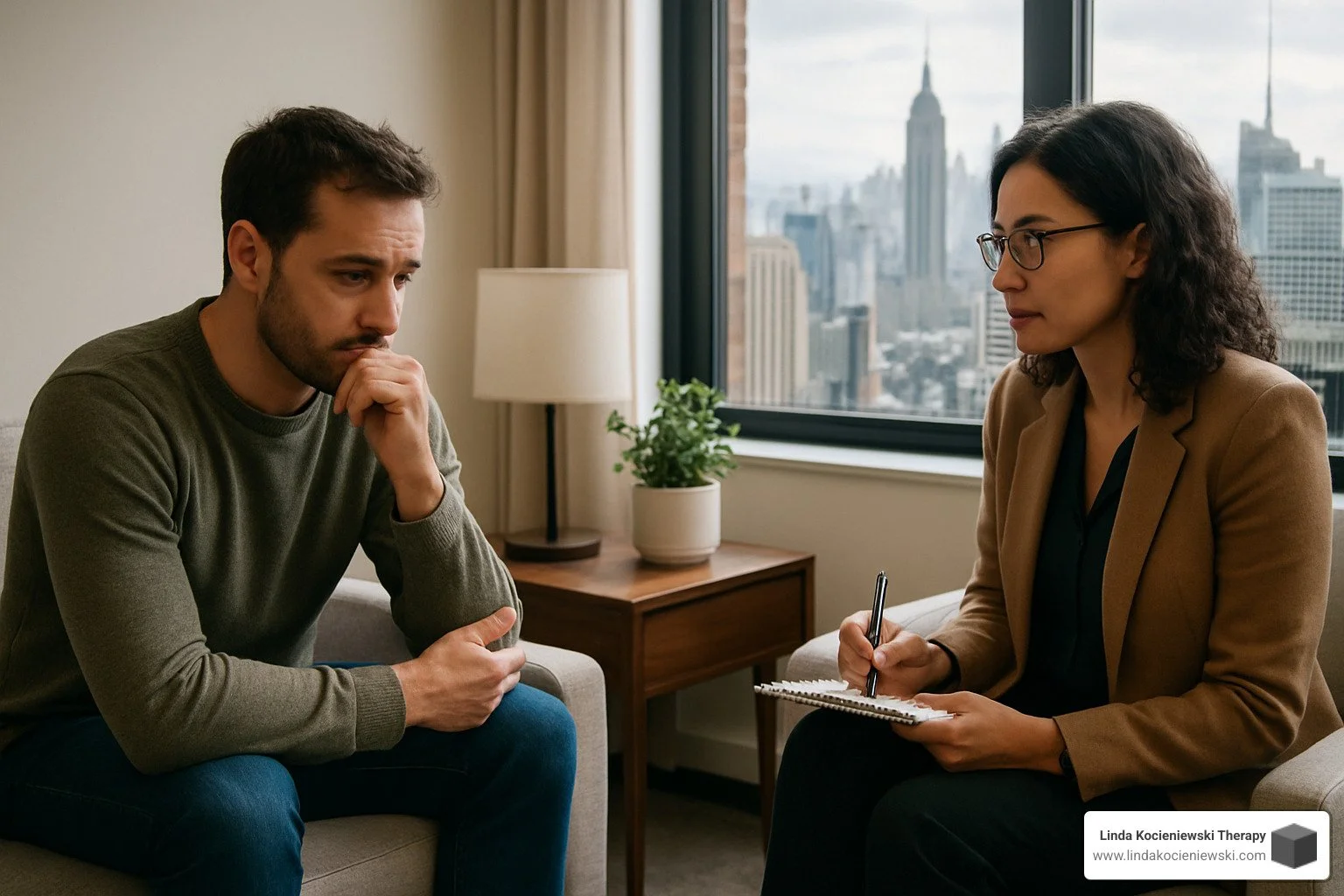Finding Your Match: A How-To Guide for Trauma Therapy in NYC
Why Finding the Right Trauma Therapist in NYC Can Transform Your Life
If you're searching for a trauma therapist nyc, you're taking a crucial step toward healing and reclaiming your life. The journey from surviving trauma to thriving requires professional support, especially in a city where stress can amplify existing wounds.
Quick Guide to Finding a Trauma Therapist in NYC:
• Check credentials: Look for LCSW, PhD, or PsyD with trauma specializations
• Verify certifications: EMDRIA-certified for EMDR, somatic therapy training
• Consider modalities: EMDR, CBT, somatic experiencing, attachment-focused approaches
• Location options: In-person (Midtown Manhattan) or online throughout New York State
• Insurance: Many therapists work out-of-network with reimbursement options
• Initial consultation: Most offer brief calls to assess fit before committing
According to the National Council for Behavioral Health, 70 percent of adults in the United States have experienced some type of traumatic experience at least once in their lives. Yet many people struggle in silence, unaware that their anxiety, depression, relationship difficulties, or career challenges may stem from unresolved trauma.
Trauma doesn't just live in your mind—it affects your entire nervous system. When left untreated, traumatic experiences can lead to flashbacks, hypervigilance, emotional numbness, and difficulty forming healthy relationships. The good news? Modern trauma therapy offers powerful tools for healing that can help you process difficult memories and build resilience.
Finding the right therapist means more than just picking a name from a directory. You need someone who understands trauma's complex effects on both mind and body, offers evidence-based treatments, and creates a safe space for your healing journey. Whether you're dealing with childhood abuse, recent trauma, or complex PTSD, the right therapeutic relationship can be life-changing.
I'm Linda Kocieniewski, a Certified EMDR Therapist and EMDRIA Approved Consultant who has been helping people overcome trauma and reach their fullest potential for many years. As an experienced trauma therapist nyc based in Midtown Manhattan, I specialize in attachment-focused EMDR and offer both regular weekly sessions and intensive formats to support your unique healing journey.
Understanding Trauma & When to Seek Help
Trauma isn't just about surviving something terrible—it's about how overwhelming experiences leave lasting imprints on your mind, body, and spirit. What makes trauma so complex is that it's deeply personal. An event that completely overwhelms one person might not affect another the same way.
Acute trauma happens when a single shocking event turns your world upside down—a car accident, assault, or witnessing something terrible. Chronic trauma develops from repeated exposure to highly stressful situations over time, like ongoing domestic violence or workplace harassment. Complex trauma usually has roots in childhood, stemming from abuse, neglect, or inconsistent caregiving when your brain was still developing.
The reality is that trauma is incredibly common. Many people struggle with symptoms for years without realizing their anxiety, depression, or relationship difficulties might be connected to past traumatic experiences.
How Trauma Affects Your Brain and Body
Trauma literally changes your brain. Your amygdala—your brain's alarm system—goes into overdrive, becoming hypervigilant and constantly scanning for danger. Meanwhile, your hippocampus, which processes memories, can become impaired. This is why traumatic memories feel fragmented—intense images, sounds, or body sensations that seem to come from nowhere.
Your nervous system can become dysregulated, leaving you stuck in fight-or-flight mode or causing emotional shutdown. Trauma also lives in your body through somatic memory—chronic pain, digestive issues, or sleep problems without clear medical causes.
When to Seek Professional Help
Consider reaching out if symptoms have lasted more than a month after a traumatic event. Pay attention to how trauma affects your daily functioning—work performance, concentration, or basic self-care. Relationship strain, avoidance behaviors, recurrent intrusive memories, unexplained physical symptoms, or using substances to cope all indicate it's time for professional support.
Seeking help isn't about being weak—it's recognizing that some experiences are too big to process alone. Asking your primary care physician for a referral can be a good starting point, and you can explore navigating therapy options to understand what's available.
Trauma Therapist NYC: How to Find and Choose the Right Therapist
Finding the right trauma therapist NYC requires more than a simple Google search. The therapeutic relationship is the foundation of healing, so taking time to find someone who truly understands your needs is essential.
Starting your search strategically makes all the difference. Asking your primary care physician for a referral is often the most effective first step. Professional therapist directories offer another valuable resource, allowing you to filter by location, specialization, and treatment approaches.
Scheduling logistics matter more than you might think. Consider whether you need evening or weekend availability, and decide if you prefer in-person sessions in Midtown Manhattan or the convenience of online therapy throughout New York State.
Vetting Credentials & Modalities
Verification of credentials should be your first priority. Check your state's licensing board to confirm any trauma therapist NYC you're considering holds proper licensure as a Licensed Clinical Social Worker (LCSW), Psychologist (PhD/PsyD), or Licensed Mental Health Counselor (LMHC).
Trauma-specific certifications indicate specialized training beyond basic licensure. EMDRIA certification for EMDR therapy represents rigorous training in one of the most effective trauma treatments available. Look for therapists with years of experience working specifically with adult trauma clients and adult-focused care.
Evidence-based therapeutic modalities form the backbone of effective trauma treatment. EMDR (Eye Movement Desensitization and Reprocessing) has robust research support for processing traumatic memories. Somatic therapies address how trauma gets stored in the body, while attachment-focused approaches are especially valuable for developmental trauma.
Matching Personal Preferences
Beyond credentials, personal compatibility significantly influences therapeutic success. Communication style varies dramatically among therapists—some offer direct, structured feedback while others provide gentler, more exploratory approaches.
Identity alignment can be crucial if cultural background, gender identity, or other aspects of your experience play important roles in your life. Session cadence preferences deserve consideration—some people thrive with weekly sessions while others benefit from intensive formats.
For comprehensive guidance on this process, our detailed resource on Navigating Therapy Options offers additional strategies for finding the right therapeutic match.
The Therapy Journey: What to Expect From Intake to Long-Term Healing
Starting therapy can feel both exciting and nerve-wracking. Understanding what to expect can help ease those first-session jitters and give you a realistic picture of how healing unfolds over time.
Your First Appointment
We begin every therapeutic relationship with a complimentary Zoom consultation. This isn't therapy itself—think of it more like a friendly coffee chat where we get to know each other and see if we click. During this conversation, I'll learn about what's bringing you to therapy and share how I might be able to help.
If we both feel like we're a good fit and you'd like to work together, we'll talk about what you'd like to gain from therapy and how you'd like to feel and live better. There's no pressure—sometimes the first therapist you talk to isn't the right match, and that's perfectly okay.
Once we decide to work together, your first full session focuses on getting the foundation right. We'll complete intake paperwork together, which covers your background, current symptoms, and what you're hoping to achieve. I'll ask about your trauma history, but you're always in control of how much detail you share and when.
Safety planning is crucial in trauma work. We'll identify your current coping strategies and support systems, and I'll teach you some grounding techniques you can use if you feel overwhelmed between sessions. Creating a collaborative treatment plan means we're working as a team from day one—your input shapes everything we do.
As a solo practitioner, I can offer the personalized attention that makes this process feel safe and manageable. We go at your pace, always.
Ongoing Sessions & Milestones
Once we establish care, we'll meet on a regular weekly basis. I provide proven and effective therapies in a safe and comfortable manner to support your progress in life and healing. Together, we work as a team to ensure you receive what you need to move forward in your journey, fostering improved well-being and a happier life.
Trauma healing typically happens in phases, though everyone's journey looks different. In the beginning, we focus on skill building and emotional regulation. This might feel less dramatic than what you see in movies, but these coping strategies become the foundation for everything else. Learning to calm your nervous system and feel grounded in your body is essential before we dive deeper.
As you develop these tools, we begin the memory processing phases using attachment-focused EMDR. This is where the real change happens—traumatic memories that once felt overwhelming start losing their emotional charge. You'll still remember what happened, but it won't hijack your nervous system anymore.
Resilience tracking happens naturally as we work together. You might notice you're sleeping better, feeling less anxious in crowds, or able to have difficult conversations without shutting down. These milestones show us we're on the right track.
The graduation indicators aren't about never feeling upset again—they're about having the tools to handle life's challenges without being derailed by trauma responses. Some people know they're ready to wrap up when they realize they haven't thought about their trauma in weeks. Others feel ready when they can talk about their experiences without their heart racing.
We also discuss relapse prevention strategies and after-care planning. Healing isn't always linear, and having a plan for maintenance check-ins or booster sessions can provide peace of mind as you continue your journey independently.
Working with a trauma therapist NYC who understands the unique stresses of city life means we can address how your healing intersects with daily realities like subway anxiety, work pressure, or navigating crowded spaces. Your therapy is custom to help you thrive in your actual life, not just in theory.
Modalities & Resources: Evidence-Based Treatments and NYC Support Networks
When you're searching for a trauma therapist NYC, understanding different therapeutic approaches helps you make informed decisions. Cognitive Behavioral Therapy (CBT) focuses on changing thought patterns and behaviors. EMDR therapy uses bilateral stimulation to help your brain process traumatic memories. Somatic therapy addresses trauma that lives in your body.
Each approach offers unique benefits, and the key is finding what resonates with your particular situation and working with a therapist who can adapt their approach to your needs.
Spotlight on EMDR & EMDR Intensives
EMDR has revolutionized trauma treatment by helping your brain process traumatic memories so they no longer trigger overwhelming responses when you encounter reminders.
The eight-phase EMDR protocol creates a structured yet gentle path through healing. We begin with history-taking and treatment planning, then move through preparation and stabilization before targeting specific traumatic memories. During processing phases, bilateral stimulation helps your brain integrate difficult experiences.
What makes EMDR particularly powerful is how it works with your brain's natural healing capacity. Rather than just talking about trauma, EMDR helps your nervous system actually process and integrate these experiences.
EMDR intensives represent one of the most exciting developments in trauma therapy. Instead of traditional weekly sessions, intensives involve longer sessions over consecutive days or weekends. This concentrated approach can accelerate healing dramatically.
The advantages include faster results, maintained focus for deeper processing, and reduced overall treatment time. Many clients find intensives particularly helpful when they're ready to dive deep into their healing work. For comprehensive information about this approach, explore our detailed guide on Intensive Therapy for Trauma.
Integrating Community Support
While individual therapy forms the foundation of trauma treatment, community support plays a vital role in sustained healing. Research shows that social connection ranks among the most powerful factors in trauma recovery.
Group therapy options throughout NYC offer peer support from others who understand your experience. Family involvement can be crucial when trauma has affected your closest relationships. The NYC trauma recovery community offers numerous resources beyond formal therapy, including peer support groups and educational workshops.
For additional insights into trauma treatment and community resources, this scientific research on community support provides valuable context about the role of social connection in healing.
Frequently Asked Questions about Trauma Therapy in NYC
When you're considering trauma therapy, it's natural to have questions. These are some of the most common concerns I hear from people searching for a trauma therapist NYC.
How long does trauma therapy typically take?
The type of trauma you've experienced plays a significant role. Single traumatic incidents often respond well to structured protocols like EMDR in 8-25 sessions. Complex developmental trauma may take longer as we address deeper patterns and rebuild your sense of safety.
Your chosen treatment approach also affects timing. EMDR, particularly in intensive formats, can produce remarkable results in a shorter timeframe. Your individual readiness and life circumstances matter tremendously—strong coping skills and supportive environments often lead to faster progress.
Progress isn't always linear. Some weeks bring huge breakthroughs while others feel more challenging. This ebb and flow is completely normal and doesn't mean you're not healing.
What if my symptoms return after successful treatment?
Experiencing some return of symptoms doesn't mean your therapy failed—it means you're navigating life's natural ups and downs. During times of high stress or major life changes, you might notice familiar responses resurface.
The difference is that now you have tools. You have coping strategies, insights about your patterns, and knowledge that healing is possible. If symptoms return, reach out early rather than waiting. Many clients benefit from occasional booster sessions to refresh skills or process new stressors.
Are online sessions as effective as in-person ones?
Studies consistently show that online therapy can be just as effective as in-person treatment for trauma. Online therapy offers real advantages—no commute time, being in your own safe space, and privacy.
For trauma work specifically, online sessions can be particularly beneficial. You can create your ideal therapeutic space at home and know that after our session, you're already in a familiar place to process whatever came up.
I offer both in-person sessions in Midtown Manhattan and secure online sessions throughout New York State, so you can choose what feels most comfortable. The most important factor isn't the format—it's that you feel safe, supported, and ready to do the important work of healing.
Conclusion
Healing from trauma is not only possible—it's your birthright. While the journey requires courage and commitment, you don't have to walk this path alone. The right therapeutic relationship can provide the safety, tools, and support you need to process difficult experiences and reclaim your life.
Every person's healing journey is unique, which is why finding the right trauma therapist NYC means looking beyond credentials to find someone who truly understands your specific needs. Whether you're dealing with recent trauma, childhood wounds, or complex PTSD that has affected you for years, evidence-based treatments like attachment-focused EMDR can help you find relief and build genuine resilience.
Working with a solo therapist offers distinct advantages that larger practices simply can't match. You'll receive personalized attention custom specifically to your healing goals, consistent care from someone who gets to know you deeply, and the flexibility to adapt treatment as you grow and change. There are no institutional constraints or rotating staff—just genuine, focused support for your unique journey.
The beauty of trauma therapy lies in its ability to help you move from simply surviving to truly thriving. You have the right to feel safe in your own body, to form meaningful relationships without fear, and to pursue your dreams without being held back by past experiences. Seeking help is a sign of strength, not weakness—it takes tremendous courage to face trauma and commit to healing.
Modern trauma therapy, particularly EMDR, has revolutionized how we approach healing. What once seemed impossible—processing traumatic memories without being retraumatized—is now not only possible but predictable. The attachment-focused EMDR model we use recognizes that trauma often affects our ability to connect with others, and healing happens within the context of a safe, attuned relationship.
Whether you choose weekly sessions or an intensive format, whether you prefer meeting in person in Midtown Manhattan or connecting virtually from anywhere in New York State, your healing journey will be designed around what works best for you. There's no one-size-fits-all approach because your trauma experience is unique to you.
If you're ready to begin your healing journey, I invite you to schedule a complimentary consultation. During this brief call, we can explore whether attachment-focused EMDR and integrative psychotherapy might be the right fit for your goals. Together, we can discuss what you'd like to gain from therapy and how you'd like to feel and live better.
For more information about our EMDR services and how they can support your healing, visit our EMDR services page. You can also learn more about EMDR Therapy in NYC through our detailed blog resources.
Every day you live with unresolved trauma is a day you're not fully living the life you deserve. Your healing matters. Your life matters. And with the right support, change is not just possible—it's inevitable.
Linda Kocieniewski, LCSW offers attachment-focused EMDR and integrative psychotherapy to help adults reclaim vibrant, fulfilling lives. You don't have to carry these burdens alone anymore.



